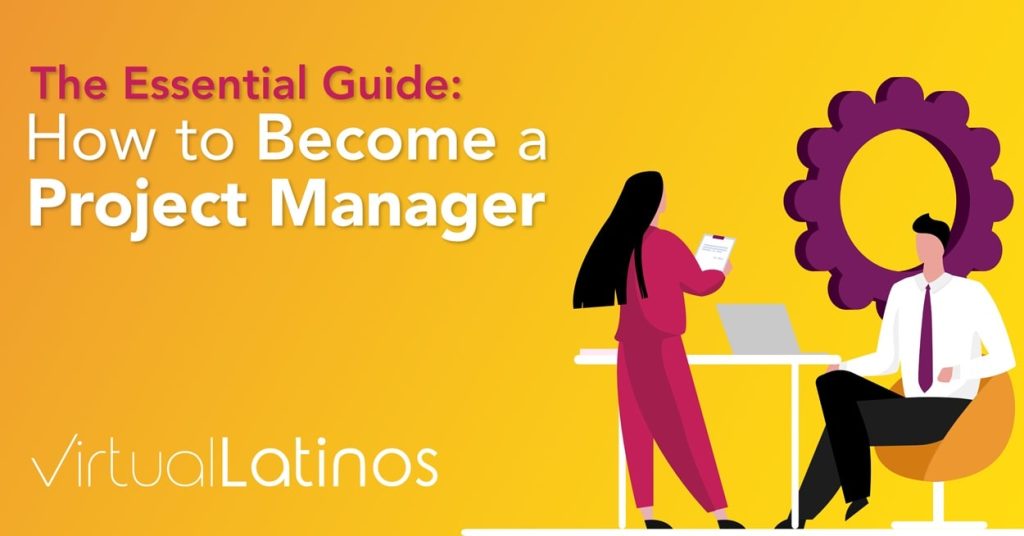Table of Contents
ToggleBecoming a project manager is an exciting and fulfilling career path that allows you to lead teams, drive change, and make a significant impact within an organization. Whether already working in a related field or starting from scratch, this comprehensive guide will provide the necessary steps to become a successful project manager.
Understanding the Role of a Project Manager
Before embarking on your learning on how to become a project manager, it’s essential to have a clear understanding of the role and responsibilities involved. A project manager is responsible for overseeing and managing a project from its inception to completion. They play a crucial role in planning, executing, monitoring, and controlling all aspects of the project.
Regardless of the industry, project managers follow a similar framework consisting of five key phases: initiation, planning, executing, monitoring and controlling, and closing.
1. Initiation
The initiation phase is the first step in any project. During this phase, the groundwork is laid to determine whether a project should be pursued. It involves creating a business case to justify the need and value of the project, as well as conducting a feasibility study to assess the project’s likelihood of success.
2. Planning
Once a project is approved, it moves into the planning phase. This step is where the project manager and team develop a detailed project plan that outlines the scope, objectives, deliverables, tasks, schedule, budget, risks, resources, stakeholders, and communication strategies. A comprehensive plan sets the foundation for successful project execution.
3. Executing
After the planning phase, the project is ready for execution. This new step involves carrying out the tasks outlined in the project plan, hitting key milestones, and managing the team’s progress. Different project management methodologies, such as Agile, Scrum, Lean, Waterfall, Kanban, and Six Sigma, can be employed based on the project’s requirements.
4. Monitoring and Controlling
While the project is being executed, the project manager continuously monitors and controls the progress to ensure that critical milestones are met and the project stays on track. This action includes regular communication with the team and stakeholders, evaluating performance against established baselines, reporting progress, implementing change control processes, and ensuring quality control.
5. Closing
Once the project is completed, the project manager oversees the closing phase. This phase involves evaluating the project’s results, ensuring all administrative tasks are completed, and archiving records. It’s essential to conduct a post-project review to identify lessons learned and areas for improvement.
Learn more: The Role of Virtual Project Managers: Driving Success in Remote Teams
Developing Essential Skills for Project Management
To become an effective project manager, you need to develop essential skills that will enable you to navigate the challenges and complexities of the role. These skills can be categorized into two main areas: soft and hard.
Soft Skills for Project Managers
Soft skills, also known as interpersonal skills or people skills, are crucial for effective project management. They include:
- Communication Skills: Project managers must be proficient in written and verbal communication. They must effectively convey information, listen actively, and understand nonverbal cues to manage teams and stakeholders.
- Leadership Skills: Project managers serve as leaders, motivating and influencing their teams to achieve project goals. They should inspire and build consensus among team members, especially during challenging times.
- Decisiveness: Project managers must make clear and timely decisions to keep the project moving forward. They should weigh input from team members and stakeholders but also be able to make tough decisions when necessary.
- Time Management: Project managers need excellent time management skills to prioritize tasks, allocate resources effectively, and ensure project milestones are met. They should anticipate challenges and adjust schedules as needed.
- Conflict Resolution: Conflict is inevitable in projects. Project managers should be skilled at resolving conflicts and defusing tensions to maintain a harmonious and productive team environment.
Hard Skills for Project Managers
In addition to soft skills, project managers require specific hard skills related to project management processes. These skills include:
- Budgeting: Project managers must be able to manage project budgets, control costs, and allocate resources efficiently.
- Risk Management: Identifying and managing risks is essential for successful project management. Project managers should be able to analyze potential risks, develop contingency plans, and mitigate their impact on the project.
- Data Analysis: Project managers should be familiar with key performance indicators (KPIs) and be able to analyze project data to measure progress and communicate with stakeholders effectively.
- Technical Expertise: Project managers need to have a deep understanding of their industry or domain to manage projects within that context effectively. They should be knowledgeable about the specific requirements and processes involved in their field.
Gaining Project Management Experience
While formal education and certifications are valuable, gaining hands-on project management experience is equally important. Experience allows you to apply theoretical knowledge in real-world scenarios and develop practical skills. Here are some ways to gain project management experience:
- Volunteer for Projects: Seek opportunities within your current organization or community to volunteer for projects. This action could involve assisting a project manager or taking on small projects to gain exposure and experience.
- Take on Project Management Roles: Transition into a project management role within your current organization. This experience allows you to manage projects under the guidance of experienced professionals and learn on the job.
- Freelance or Contract Work: Consider taking on freelance or contract project management assignments to gain experience across different industries and project types. This option can help you build a diverse portfolio and establish a reputation as a capable project manager.
- Professional Networking: Attend industry events, join professional associations, and connect with other project management professionals. Networking can provide valuable opportunities and mentorship to enhance your project management experience.
Pursuing Project Management Education and Certifications
While project management experience is crucial, formal education and certifications can provide a solid foundation and enhance your credibility as a project manager. Here are some educational paths and certifications to consider:
- Bachelor’s or Master’s Degree: Pursuing a degree in project management or a related field can give you a comprehensive understanding of project management principles, methodologies, and best practices. Look for accredited programs that offer internships or cooperative education opportunities.
- Project Management Certifications: Several widely recognized project management certifications can boost your credentials and demonstrate your proficiency in project management. The Project Management Professional (PMP) certification is one of the most sought-after certifications in the field. Other certifications include Certified Associate in Project Management (CAPM), PRINCE2, and Agile certifications such as Certified ScrumMaster (CSM) or Agile Certified Practitioner (PMI-ACP).
You may also like: Take the “Introduction to ChatGPT” course through the Virtual Latinos Academy
Mastering Team Management and Communication
Effective team management and communication are critical skills for project managers. Here are some tips to master these skills:
- Foster Collaboration: Encourage collaboration and create a positive team culture where every member feels valued and motivated. Foster open communication channels and allow team members to share ideas and feedback.
- Clear Communication: Ensure that communication is clear, concise, and consistent. Tailor your communication style and medium to suit the needs of different stakeholders. Active listening is an essential component of effective communication.
- Build Relationships: Take the time to build strong relationships with your team members and stakeholders. Show empathy, respect diverse perspectives, and foster a sense of trust and camaraderie within the team.
- Conflict Resolution: Develop conflict resolution skills to address conflicts and disagreements constructively. Encourage open dialogue, mediate conflicts, and find win-win solutions that benefit both the project and the individuals involved.

Utilizing Project Management Tools and Software
Project management software can significantly enhance productivity and streamline project workflows. Here are some popular project management tools to consider:
- Project Management Platforms: Asana, Trello, and Monday.com offer comprehensive project management features, including task management, collaboration tools, and progress tracking.
- Communication and Collaboration Tools: Tools like Slack, Microsoft Teams, and Google Meet facilitate real-time communication, file sharing, and team collaboration.
- Gantt Chart Software: Gantt chart software like Microsoft Project or TeamGantt allows you to create visual project timelines, track dependencies, and monitor progress.
- Kanban Boards: Kanban tools like Jira or Trello help manage tasks and visualize project workflows using a card-based system.
Embracing Organizational and Time Management Skills
Being organized and managing your time effectively is crucial for project managers. Here are some tips to improve your organizational and time management skills:
- Set Clear Goals and Priorities: Clearly define project goals, objectives, and deliverables. Prioritize tasks based on importance and urgency and focus on high-priority activities.
- Develop a Project Schedule: Create a project schedule that outlines the timeline, milestones, and deadlines. Use Gantt charts or project management software to visualize the schedule and track progress.
- Delegate and Allocate Resources: Assign tasks to team members based on their skills and availability. Properly allocate resources, including time, budget, and workforce, to ensure smooth project execution.
- Manage Stakeholder Expectations: Maintain regular communication with stakeholders and manage their expectations throughout the project. Keep them informed about progress, changes, and potential risks.
Becoming Proficient in Diagramming and Visualization
Diagramming and visualization tools can help project managers communicate complex ideas and concepts effectively. Here are some essential tools and techniques to master:
- SWOT Analysis: Use SWOT (Strengths, Weaknesses, Opportunities, Threats) analysis to assess project feasibility and identify potential risks and opportunities.
- Gantt Charts: Create charts to visualize project timelines, tasks, and dependencies. These tools help in tracking progress and managing deadlines.
Work Breakdown Structures: Use work breakdown structures (WBS) to break down complex projects into smaller, manageable tasks. These tools help in organizing and prioritizing work. - Unified Modeling Language (UML): UML diagrams, such as use case diagrams, activity diagrams, and class diagrams, can help in understanding project requirements, testing applications, and documenting systems.
Exploring Remote Project Management Opportunities
In today’s digital age, remote project management offers unique opportunities for professionals to work from anywhere globally. Remote project managers can collaborate with global teams, leverage technology, and enjoy a flexible work-life balance. Here are some benefits of being a project manager in a remote environment:
- Flexibility: Remote project managers can work from anywhere, allowing for a better work-life balance and increased job satisfaction.
- Global Collaboration: Remote project management enables collaboration with diverse teams from different locations, cultures, and time zones, leading to enriched perspectives and innovative solutions.
- Cost Savings: Remote work eliminates commuting and office expenses, resulting in cost savings for the project manager and the organization.
- Increased Productivity: Remote project managers often experience increased productivity due to fewer distractions and the ability to create an optimal work environment.
You may like: From Entry-Level to Leadership: A Successful Virtual Career
Becoming a Project Management Virtual Assistant
If you are a skilled professional from Latin America seeking remote project management opportunities, joining Virtual Latinos as a virtual assistant can be an excellent option. Virtual Latinos connects Latin American bilingual professionals with companies in the United States needing virtual assistants with project management skills.
By joining Virtual Latinos, you can leverage your project management expertise and work with U.S. companies while enjoying the benefits of remote work. This platform provides a gateway to exciting project management roles and opportunities.
Becoming a project manager requires essential skills, practical experience, and continuous learning. By understanding the role, developing the necessary skills, gaining experience, pursuing education and certifications, and mastering team management and communication, you can pave your way to a successful project management career.
Additionally, exploring remote project management opportunities and considering platforms like Virtual Latinos can open doors to exciting and fulfilling roles as a virtual assistant with a project management focus. Embrace the journey, continue to learn and grow, and enjoy the rewards of being a project manager in today’s dynamic and evolving world.
Ready to take the next step? Elevate your career as a Project Manager Virtual Assistant with Virtual Latinos. Join us and lead in the dynamic world of remote work!






